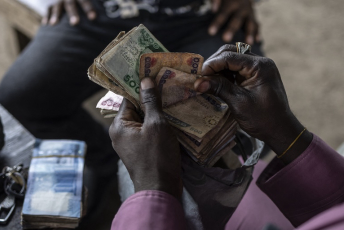Last year, the World Bank released a report putting the cost of crime in South Africa at the equivalent of some 9.6% of the country’s Gross Domestic Product (GDP). This includes direct losses of 2.6% of GDP, 4.2% in expenditures such as security and insurance, and 2.8% in opportunity costs.
The report says these resources could elevate South Africa’s growth rate by at least a percentage point if productively invested.
Part of the data used for this calculation was an estimate of the impact of criminal extortion on business. Based on a 2022 analysis by Jenni Irish-Qhobosheane, the World Bank estimated this at 0.7% of South Africa’s GDP.
It commented: ‘The construction sector faces specific extortion problems linked to well-organized mafias, dubbed local “business forums,” that invade construction sites and demand a ransom or a stake in development projects, often violently.’
The term ‘business forum’ has been adopted by networks of small, emerging and typically township-based businesses. These sometimes conduct legitimate engagements with the state and others, but in some instances have taken on aggressive rent-seeking roles.
The so-called construction mafia originated in the Durban area in 2015. Local ‘business fora’ descended on construction sites, threatening violence unless their demands for money or jobs were met. Operations spread to Gauteng and the Western and Eastern Cape.
There have been clear attempts to give these activities a political flavour. Early iterations came together in the Federation for Radical Economic Transformation (FFRET), drawing on a concept then being invoked to justify extractive economic policies and attendant corruption.
Greg Ardé argues in an amaBhungane investigation that the criminal economy of the ‘business fora’ would claim to have the patronage of members of the political establishment – e.g., former eThekwini mayor Zandile Gumede (she denied this) – creating a symbiotic relationship between the two.
Starting with these early attempts to associate themselves with political agendas and power brokers, the ‘business fora’ have moved to acquire a veneer of societal respectability. The FFRET, for example, rebranded itself the Black Business Federation in 2020, at an event addressed by KwaZulu-Natal’s MEC for Economic Development, Tourism and Environmental Affairs.
The mafias have increasingly phrased their demands in reference to state policy. This is the idea of the ‘30% demand’ originally referred to in the 2017 Preferential Procurement Regulations. These provided that 30% of state contracts valued at over R30 million should (‘if feasible’) be reserved for contractors covered by empowerment policy (typically small firms owned by black people or women).
While inapplicable to private projects, it provided a pretext for extortionate demands on private developers – the pattern being that ‘30%’ of the contract value should be made as a cash payment or in subcontracts to specific beneficiaries. Whether there had been contracting to local businesses other than those associated with the mafias was irrelevant.
Firms faced with these demands were inclined to give in. Attempts to seek legal or police protection proved largely fruitless, as interdicts were ignored and police action was ineffective.
There’s evidence that actual instances of violence have declined – although this may show that extortion has become normalised.
Centre for Risk Analysis Head Chris Hattingh summed up the drivers behind the construction mafia: ‘Malign actors recognise there are opportunities for them to exploit governance and policing weaknesses, along with the decline in capacities, skills, and work on the part of local governments, police and intelligence services.’
This has come with a clear economic cost: extrapolating the 0.7% estimate to last year’s GDP, it amounted to almost R49 billion. More than this, the threat of violence over construction projects is a constant strain on those who work on them – the fear that they may be physically harmed, or their livelihoods destroyed.
For others, it’s an incentive to quit South Africa and offer their talents to countries where engineering and building are safer. For those who can’t, with law enforcement ineffective in providing protection, this leaves an unpalatable suite of options: pay extortion fees, engage extensive private security or retaliate.
Meanwhile, mafias’ success in extorting from one contract encourages this elsewhere. ‘Violence begets violence,’ says South African Forum of Civil Engineering Contractors CEO Webster Mfebe. ‘When people have seen that extortion methods yield results, they mimic the same tactics and strategies.’
Since construction provides the hard infrastructure on which an economy depends, crime that targets it has adverse multiplier effects. Given that much of South Africa’s infrastructure needs upgrading, there are many opportunities for the country’s mafias.
The construction mafia represents a fusion of the worst impulses in South Africa’s political economy: acquisitive rent-seeking, using political connections, bribing governance institutions and employing violence. Dealing with it demands both law enforcement and political will.
The state’s failure to exercise its authority is a deep-rooted crisis, and this has fuelled impunity. South Africa needs high-quality crime intelligence, a police service able to enforce interdicts, and a National Prosecuting Authority that can expeditiously bring successful prosecutions.
As an immediate measure, incentives must be offered for companies to hire private security on high-risk sites, and closely coordinate with the police to face off extortion attempts. A joint investigative and prosecuting task team should be established to bring a series of cases, both to disrupt existing mafias and to demonstrate the state’s resolve in future.
This will need to be tied to political leadership – mayors, MECs and ministers – that makes itself visible and accountable in confronting extortion. Implicated politicians must not only be prosecuted but ostracised by their colleagues.
South Africa must also make a turnaround in its political and administrative culture, which has long tolerated the interface between politics and criminality. It’s unlikely that the construction mafia would have gained traction had elements of the political elite not provided the implicit or explicit sanction for its demands. Or had individual politicians not collaborated with it, others appeased it, and the wider public tolerated it.
All of society must respond. ‘There must be buy-in from local communities to work against these mafias – to make them understand that working with them is not in their interests,’ says Hattingh.
What starts on construction sites doesn’t end there. Its costs are counted in a low-growth economy, forfeited opportunities, and South Africa’s enduring developmental malaise.
Terence Corrigan, ENACT Consultant and Project and Pubs Manager, South African Institute of Race Relations
Image: Arne Hoel / World Bank







